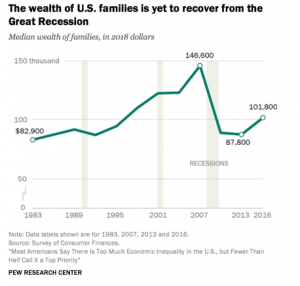The social problems described in my classmates’ posts ranging from but not limited to food insecurity, US incarceration rates, and unequal access to education may be a symptom of an arguably widening and bigger issue in the US not unrelated to sustainability and social justice topics. According to a Pew Research study published in February ’22, since 2007 earnings for middling workers in the US have remained stagnant while in that same time frame the wealth of upper-income families has exploded by about $200,000 give or take measured in 2018 median dollars. Simply put income inequality in the US is widening and one hedge fund worker and now author Kathy O’Neil in her book Weapons of Math Destruction argues that as we progress into the information age technology can produce some potential negative externalities for low-income people one of them being an over-policing of low-income neighborhoods. This tendency increases the initial chance of people living in these communities ending up in jail for first-time offenses, but she also adds that the recidivism rate, that is the tendency to go back, increases too. Additionally, these are the same communities that often face food insecurity, unstable employment, and unequal access to education at least from a statistical standpoint and perhaps sometimes a very real standpoint in the aggregate. I think from this standpoint we can ask ourselves what types of opportunities does technology offer us middle-class folk that we can use to increase the overall value of our society from top to bottom(monetary, agriculturally, etc.), and what necessary but difficult changes must we adopt to prevent divisive ideologies from distracting from the main focus of our society’s goal to survive and thrive.



Mathematics of Sustainability
Union College MTH-063-01 Spring 2022

